Create a free collaborative word cloud with Wooclap, the interactive online tool
Word cloud: a visual and dynamic representation showing the essential terms of a notion, of various ideas, or of a reasoning or concept, constructed from various contents, such as images, colors and text.
Allow participants, in their work and use of the dedicated page, to generate an interactive word cloud that reveals their choices, opinions and various contents. The words submitted more frequently are automatically highlighted.
Use this interactive functionality for sessions and courses, and make users active in their own learning process thanks to this web 2.0 resource !

Definition of a word cloud
What is a word cloud?
A word cloud, or tag cloud, is a colored visual representation of associated words or terms frequently used during a session. It makes it possible to highlight, in an interactive and concise way, the main contents of the session, such as keywords that describe the main themes of a specific topic or concept. The more a word or term comes up, the more it is highlighted in the word cloud.
A simple and fun web tool, it promotes inclusivity and interactive animation in learning!
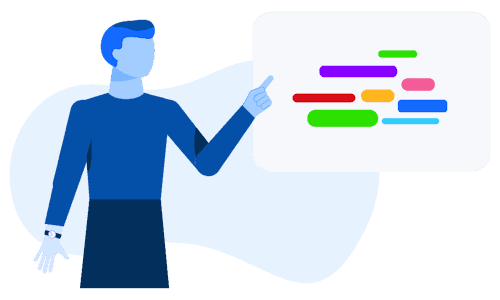
Why use a web word cloud generator?
Word cloud generators are widely used in commercial applications, marketing and education, thanks to their visual impact, interactivity and ease of use and management. This visual tool brings together various concepts that may otherwise be difficult to represent in such an integrated, immediate and easily understandable way.
.png)
Using a Wooclap word cloud with your learners offers many benefits:
- It’s a simple, practical and quick tool that saves you lots of time in designing your session and its activities, so that you can concentrate on the essentials: the transmission of knowledge and the stimulation of exchange with your students.
- A word cloud, instantly generated with Wooclap, can be used to identify the key concepts of a study session.
- This fun and concise application allows you to make sure that your users understand the session and its main contents.
- Using Wooclap’s word cloud allows you to produce a concise, pertinent and visual representation of images, texts or concepts, without losing track of them. Access your word cloud wherever you are!

Discover our examples of word clouds
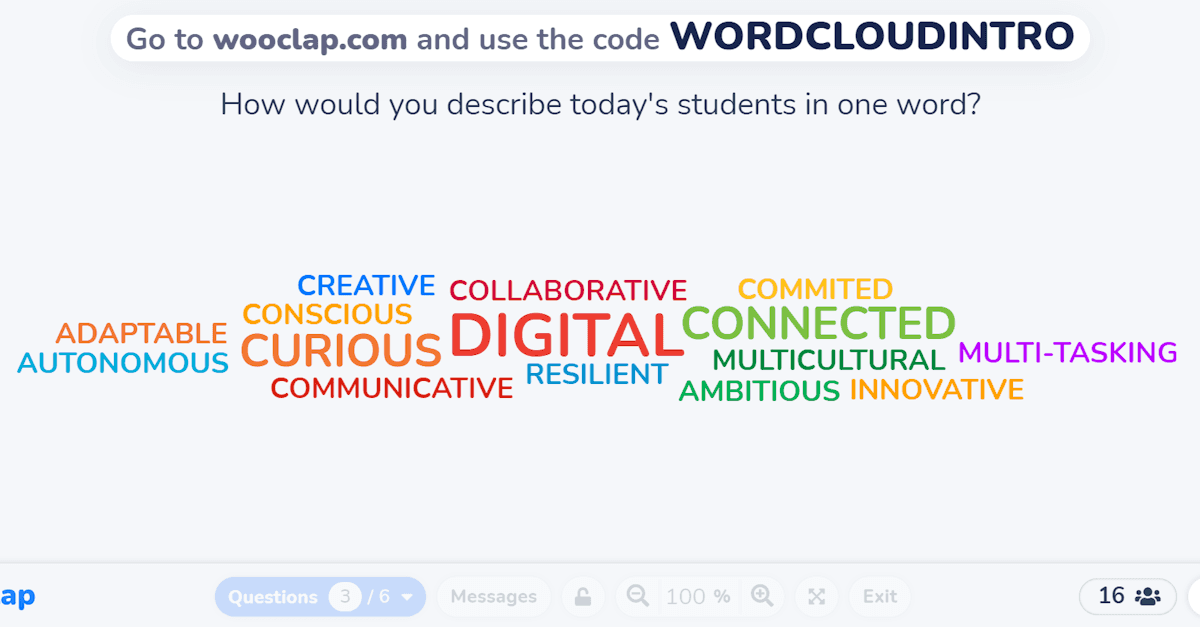
Introduction to Word Clouds
Identify key concepts, create a visual summary, or ensure that your learners understand with word clouds!


How to use a word cloud on the web with Wooclap
Want to use Wooclap word clouds but don’t know how? Don’t panic! We’ll explain exactly how to make a word cloud. 👇
Set-up of the word cloud via the Wooclap application
Set up of the word cloud
To launch the participatory word cloud web with your learners, create a user account or log in to your personal space. Go to the “Create an event” tab, and then select “Word cloud”.
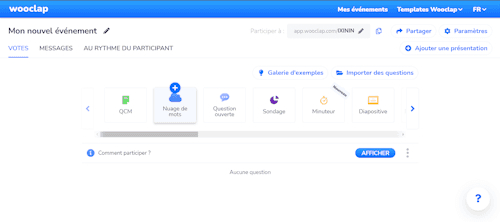
Word cloud settings
Enter what you want to ask your users, for example: “How would you describe today’s students in one word?”. Then configure your word cloud as you want, for example, setting the maximum number of characters allowed, enabling multiple answers, word accents, or even the submission of images. A whole list of parameters is available to you according to your needs and desires!
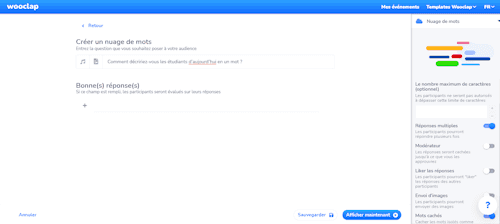
Send out the QR code
Once the word cloud has been configured, show the QR code to your audience to allow all your learners to join the work session page.
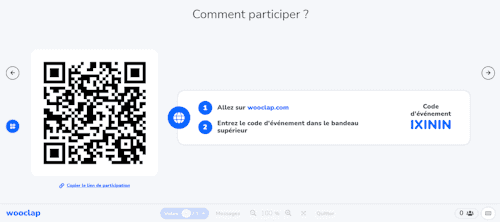
Launching the word cloud session
Invite your group to unleash their imagination and submit their own words to the word cloud. See the words appear instantly in the word cloud as soon as they are submitted. A complete, easy-to-use toolbox!
It’s important to note that the word cloud is only displayed on your screen and not that of your users. They are only able to make their own submissions.
Tip: Share your screen while the word cloud is being generated, so that your learners can follow along and see the word cloud appear without missing a beat!
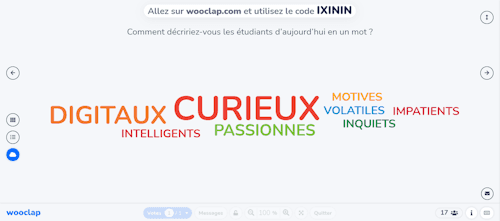
Word cloud transformation rules
- All letter accents are removed by default, unless the interface is displayed in German.
- Punctuation marks (, ; . ? ! :) are replaced by spaces.
- Extra spaces (more than two consecutive spaces) are removed.
- All letters are transformed into upper-case.
In short, the words “façade”, "Façade”, “FACADE”, “FAÇADE” and “facade” are all represented in the word cloud by “FACADE”.
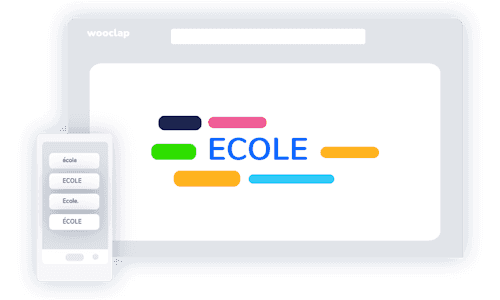
Word cloud web application display rules
- A multi-word term is kept intact as long as its size is less than 30 characters long, otherwise it is cut off at the space preceding the 30 character limit.
- More frequently submitted words are displayed larger than the others.
- A maximum of the 50 most frequent words are displayed.
- If the “Like responses” option is enabled, each “like” counts as if the response had been sent once again. Therefore, 10 likes are counted as 10 additional similar submissions.
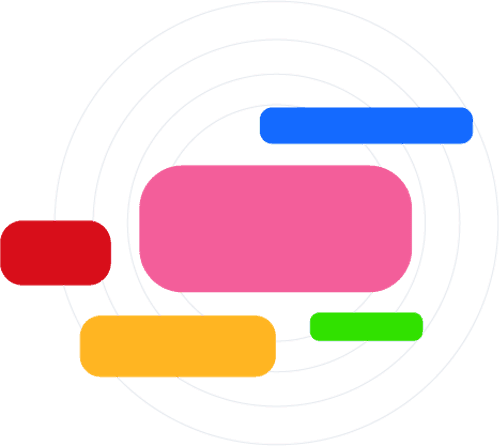
- If the “Hidden words” option is activated, the word (or term) is not displayed if it is included in the list of “Stop Words”. This can be used to prevent a word, such as “in”, from automatically being displayed on its own. Note that, for example, the term “editor-in-chief” is displayed with “in” because it is part of a compound word.
- Apart from the aforementioned transformations (e.g. letter case and accents), similar words spelled slightly differently are displayed separately in the word cloud. For example, the words “school” and “schools” are displayed separately.
- If the “Moderator” option is activated, submitted answers arrive in the small envelope located in the application at the bottom right of the presenter screen. From there, you can view each response and select whether to display it on the presenter screen or delete it.
- Finally, emojis can also be submitted.
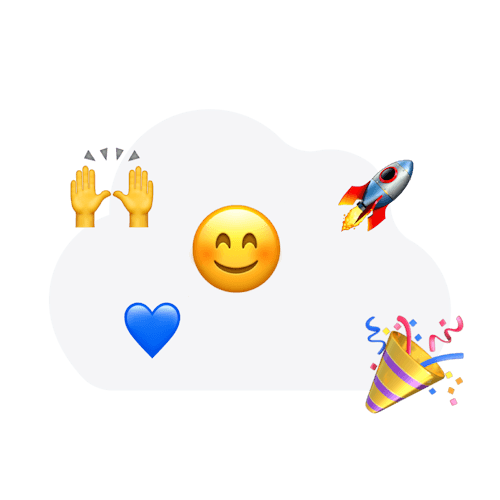
Our recommendations for using the Wooclap word cloud
- Encourage your learners to only submit one word (or term) separately in order to avoid duplicates. Don’t hesitate to tell them to like already given answers, rather than submitting the same word (or term) again. You can enable this in the word cloud settings on the application home page, in the menu on the right.
- Adapt the wording of your stimulus to minimize any uncertainties in its interpretation. For example, a stimulus such as “Today’s student is...” , rather than “What are today’s students like?”, helps orient respondents, promotes homogeneity in their submissions, and minimizes spelling differences between similar submissions.

- Don’t forget to set a limit of 30 or 50 characters in your settings to avoid having long submissions cut short.
- You can choose to put the words in the form of a list, but use the “Display word cloud” option to start displaying the word cloud just as soon as the activity starts.
- Finally, in the settings, enable “Multiple responses” to release your participants’ imagination and encourage them to construct a more complete word cloud.

Let your learners’ imagination run wild, and encourage them to study and learn in a fun way, thanks to Wooclap’s word cloud!
